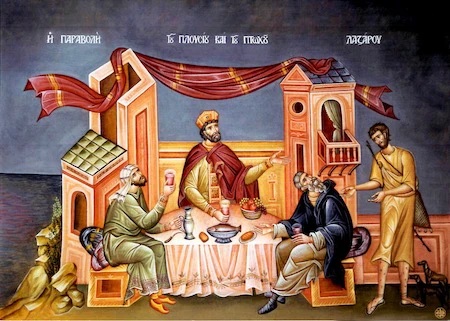- Home
- About us
- Students
- Courses
- Research
- Library
- News & Events
- Gallery
- Contact
- Our Blog
Latest News

The Parable of the Rich Man and Lazarus (Luke 16:19-31):
Is this a Parable Condemning Riches?

by Assoc. Professor Philip Kariatlis (Sub-Dean)
This coming Sunday, the Church will read the parable of Lazarus and the rich man (Lk 16:19-31). Right from the outset it has to be said that even though this story is exclusive to St Luke's Gospel, it in fact constitutes one of the most important parables within the corpus of the New Testament writings, since it summarises in a very powerful and most striking way the very essence of the Christian message. Unlike many commentators of this parable who usually like to interpret it in terms of Jesus condemning riches as such, its primary purpose, as we shall now see, was in fact to remind the listeners of the time of the importance of being loving and caring towards those around them. More specifically, Jesus wanted to remind the faithful that, in God's 'eyes', inaction and lack of love for one's neighbour was fundamentally just a serious a wrongdoing as actually doing evil.
The vivid story is familiar to most of us: Jesus succinctly contrasts Lazarus and the rich man and then goes on to reveal their ultimate plight in the life to come. Firstly, there is the anonymous rich man, who held excessive partiesevery night, wining, feasting and faring sumptuously. Coupled with this, the Gospel tells us that he was dressed in the most expensive of clothes –‘in purple and fine linen’ (Lk 16:19) – highlighting the lavishly opulent life that he was leading. Furthermore, the fact that the wealthy man entered his house via a gate is not without significance for those times in that it highlights his aristocratic status living in a huge estate surrounded by fences and gardens. From the brief description, one could easily conclude that the rich man would have been able to have anything he wanted during his lifetime. Indeed, he is depicted in outrageously excessive terms living a life of enjoyable ease and love. His overdone sumptuousness is reminiscent of what the prophet Amos had said almost eight hundred years before the coming of Christ:
Alas for those who lie on beds of ivory, and lounge on their couches, and eat lambs from the flock, and calves from the stall; who sing idle songs to the sound of the harp, and like David improvise on instruments of music; who drink wine from bowls, and anoint themselves with the finest oils, but are not grieved over the ruin of Joseph! Therefore they shall now be the first to go into exile, and the revelry of the loungers shall pass away. (Amos 6:4-7).
In total contrast to this, the Gospel portrays the predicament of the destitute Lazarus,[1] a man who was utterly poor, suffering greatly with open wounds all over his body, and not able to satisfy his hunger even from the crumbs that fell from the rich man’s table. Indeed, the Gospel accentuates the desperate situation by detailing how these same crumbs that were tossed away from the affluent man's plentiful table were also scavenged by dogs which came and licked the sores of Lazarus.[2] But Lazarus was not only poor, hungry and sick, but totally alone, utterly destitute and living on the streets with no family to care for him. Amazingly, the Gospel never mentions Lazarus complaining; rather we can surmise that he remained patient in his quandary, long suffering and never once protesting or even jealous of the rich man whom he would see every day, since Lazarus was living right outside the rich man’s house at his gate. Indeed, the great detail with which the Evangelist described the earthly predicament of Lazarus brought out all the more not only the lack of concern showed by the rich man but also his heartlessness and even callousness.
Finally, after describing the life of the two men on earth, we are immediately told of their state in the afterlife. Here, we learn that their social distance would continue for all eternity – indeed, the Gospel noted that a 'great chasm' would be fixed between them for all time. Upon dying, we are told that Lazarus was nobly and ceremoniously taken up by a choir of angels and now found himself in the company Abraham in heaven [εἰς τόν κόλπον Ἀβραάμ]. Highly significant is the fact that the Gospel describes his final abode in terms of ‘being with Abraham’ (cf. Lk 16:22) who was the figure par excellence in the Old Testament for hospitality and generosity to strangers. This betrays the importance of these two virtues in Jesus’ teaching about the kingdom. On the other hand, the parable states that therich man ended up in Hades, in a tormented and beleaguered state unable to quench his thirst. Indeed, we are told that he pleaded with Abraham to send Lazarus to dip his finger so that he could cool his tongue since the intensity of the flames was agonizingly unbearable. The story ends with the important reminder that salvation involves not only a notional belief in God but a real a yearning and willingness to put into practice what is believed; namely, a desire for purification of heart and illumination of mind in order to discern and live by all that the prophets and Moses spoke.
After reading or listening to this parable, we are led, quite justifiably, to ask what in fact Jesus wanted to teach with the story of the rich man and Lazarus. Was Jesus, for example, teaching that wealth and prosperity, in and of themselves, were necessarily sinful? In other words, was the rich man condemned simply because he was affluent; and was Lazarus justified and now in God's heavenly kingdom simply because he was poor and destitute? Surely, Jesus was not primarily concerned with such materiality as such. If God created the world out of nothing (cf. 2Mac 7:28), and therefore out of absolute love – since there was nothing compelling God to create the world – and ever since has wanted nothing from His creatures but that they become partakers of His eternal beatitude – that is, that they share in His eternal joy – surely He would not want the world, which He loves beyond imagination, to be miserable, unhappy and necessarily suffering in this life. Jesus was definitely not exhorting all people to live in the world as the poor and miserable Lazarus did.
And so, in an attempt to discern the essential and fundamental message of the Gospel reading, we discover that it is not so much concerned with people's social or financial wellbeing as it is with their attitude and willingness to assist those around them. In the specific case of the rich man, his wealth had become a hindrance for him in that his entire focus on earth was totally incongruous with the Old Testament covenant demands placed upon the Israelites by God which had to do with love towards God and neighbor. The Old Testament was clear in this regard: “you shall love the Lord your God with all your heart, and with all your soul, and with all your might” (Deut 6:5) and “You shall also love the stranger, for you were strangers in the land of Egypt” (Deut 10:19). Generous and gracious assistance for all victims of poverty, sickness and hardship in general was considered to be an indispensable ingredient for the Israelites, and by extension now, the followers of Jesus. Indeed, the essence of the Christian message is precisely this; striving to love, that is, being loving towards all people and indeed the entire created order, over which God placed the human person to be its caretaker (cf. Gen 1:28).
Now, the rich man was without excuse since the poor Lazarus was at his door and the rich man would have seen him everyday when entering or leaving his house. Moreover, a detail which has often gone unnoticed is that when pleading with Abraham in Hades to have his thirst quenched a little, the rich man said: "send Lazarus to dip the tip of his finger in water" (Lk 16:24) which reveals that the rich man actually knew him by name and had therefore recognized him as the beggar at his door. Indeed, the only reason he now referred to Lazarus is indicative of his continued selfish concern and arrogance – even now he simply wished to use Lazarus, as though he was his servant, for his own self-centered purpose. In the Greek the irony is easily recognizable in that the one requesting mercy (ἔλεος) from Lazarus was precisely the same person who never contemplated being merciful (ἐλεημοσύνη) towards Lazarus whilst on earth.
Accordingly and more specifically for us, the parable provides the opportunity to re-examine in a radically profound way, our attitude and stance generally to all people around us. We too are reminded of the importance of living lovingly. And so, we too need to show mercy and love in our life. We need to remember that the rich man was not condemned for being greedy or taking the property of another, or even for committing adultery, but the evil alone of which he was accused was his indifference. The rich man was condemned not for being rich but for his scandalously indifferent attitude towards Lazarus. And so, it is not riches as such that need to be feared but indifference, lack of interest and ultimately lack of love towards others. We end with the words of Christ Himself: “the measure you give will be the measure you get” (Mt 7:2). Consequently, the wisdom of the Gospel parable is paradoxically this: what is truly ours – that is, what really has eternal permanence and therefore validity – are only those things that we are willing to give away in this life; namely, our acts of love, since everything else will surely die away one day. Indeed, it is in this ‘living lovingly’ that we too will be able to experience little moments of eternity even in this life!
[1]The name Lazarus is not without significance in highlighting the attitude and approach to life that this man had. Lazarus, the Greek form of Eleazar means God is my help; namely, rather than his misfortune leading him to utter desperation, he place his entire trust in God and endured patiently.
[2]Interestingly, in reflecting upon the dogs in the parable, St Cyril of Alexandria wrote that when the Gospel made reference to the dogs licking the sores of Lazarus, this was meant to show that the dogs were more humane than the rich man since they sympathized with Lazarus and gently soothed his sores. Commentary on Luke, 3.



.png)